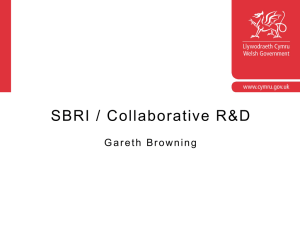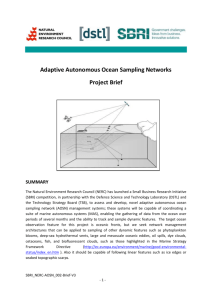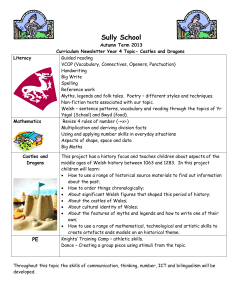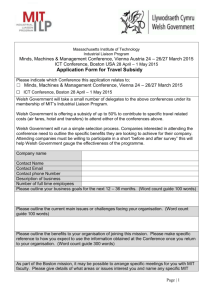the SBRI Expression of Interest form
advertisement
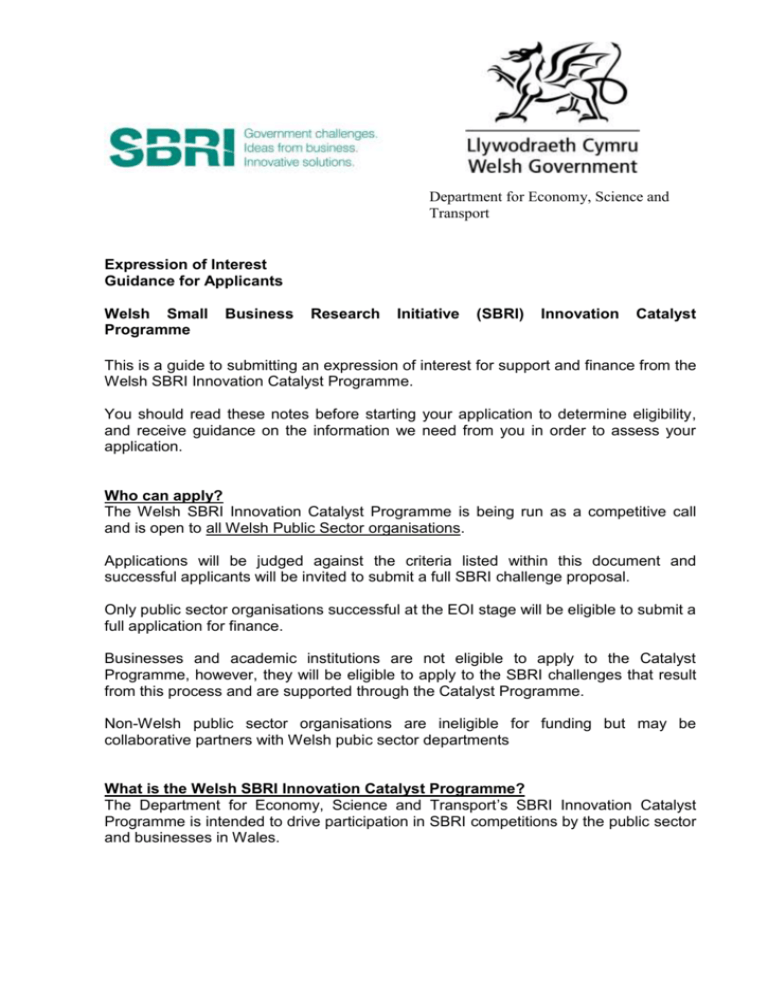
Department for Economy, Science and Transport Expression of Interest Guidance for Applicants Welsh Small Programme Business Research Initiative (SBRI) Innovation Catalyst This is a guide to submitting an expression of interest for support and finance from the Welsh SBRI Innovation Catalyst Programme. You should read these notes before starting your application to determine eligibility, and receive guidance on the information we need from you in order to assess your application. Who can apply? The Welsh SBRI Innovation Catalyst Programme is being run as a competitive call and is open to all Welsh Public Sector organisations. Applications will be judged against the criteria listed within this document and successful applicants will be invited to submit a full SBRI challenge proposal. Only public sector organisations successful at the EOI stage will be eligible to submit a full application for finance. Businesses and academic institutions are not eligible to apply to the Catalyst Programme, however, they will be eligible to apply to the SBRI challenges that result from this process and are supported through the Catalyst Programme. Non-Welsh public sector organisations are ineligible for funding but may be collaborative partners with Welsh pubic sector departments What is the Welsh SBRI Innovation Catalyst Programme? The Department for Economy, Science and Transport’s SBRI Innovation Catalyst Programme is intended to drive participation in SBRI competitions by the public sector and businesses in Wales. It is envisaged that this will catalyse the procurement of innovative solutions and help deliver a culture change which improve supplier engagement through outcome-based specification. A further aspiration of the Catalyst Programme is to help grow the Welsh R&D industry, increase commercialisation of new technologies and create jobs and wealth for Wales. The competitive Welsh SBRI Catalyst Programme seeks to identify public sector problems and challenges with a view to supporting Welsh public sector competitions which drive innovation in the areas of: – – – – Life Sciences and Health Low Carbon, Energy and Environment Advanced Engineering and Materials ICT and the Digital Economy During 2013/14, up to £1m is available on a competitive basis to support Welsh public sector departments in scoping and running their own Welsh SBRI challenges. The programme comprises: (i) a competitive fund to support Welsh public sector departments in the scoping, framing and delivering competitions under the SBRI Programme. (ii) additional measures to promote SBRI take up through awareness raising, support measures, workshops and training. The purpose of the EOI process is to identify potential Welsh SBRI challenges in order that the Welsh Government and Technology Strategy Board SBRI development team can assist Welsh public sector departments in the framing and roll out of SBRI challenges. The catalyst programme is expected to run for three years, but is subject to a 12 month review and assessment of its effectiveness and viability. The challenge must be clearly owned by the public sector organisation and successful submissions must demonstrate sufficient and appropriate personnel resource allocation for its duration. The Department for Economy, Science and Transport’s SBRI Innovation Catalyst Programme team will NOT be responsible for day to day management of successful challenges . What is SBRI? The Small Business Research Initiative (SBRI) is a mechanism which enables public sector bodies to connect with innovative ideas; and technology businesses to provide innovative solutions to specific public sector challenges and needs. The public sector is able to find innovative solutions by reaching out to organisations 2 from different sectors including small and emerging businesses. New technical solutions are created through accelerated technology development, whilst risk is reduced through a phased development programme. SBRI also provides applicants with a transparent, competitive and reliable source of early-stage funding. SBRI competitions are open to all organisations that can demonstrate a route to market for their solution. The SBRI scheme is particularly suited to small and medium-sized business, as the contracts are of relatively low value and operate in short timescales. Developments are 100% funded and focus on specific identified needs, increasing the chance of exploitation. Suppliers for each project are selected by an open competition process and retain the intellectual property generated from the project, with certain rights of use retained by the contracting department. SBRI operates as an open competition to stimulate the creation of innovative new products and services. Competitions are demand driven and result in a fully funded development contract between the company and the government department - it is not a government grant SBRI is a scheme that benefits both the ’public body’ that is running the competition and the businesses that have the opportunity of obtaining a development contract. It is a fast track, simplified process that allows Government departments to engage with businesses with which they would not normally work. The Government department (or public sector body) acts as the intelligent lead customer and is instrumental in helping the business develop its product or technology. It generally has a two-phased development approach that starts with initial feasibility and then more detailed product development. Phase one, Feasibility Studies typically last up to six months and are worth £50k£100k. Phase two, Demonstrator projects last up to two years and are worth £250k-£1m. It should result in a commercial product or service. The intellectual property is retained by the company, with user rights exercised by the department under a separate contract under fair and reasonable terms. SBRI can be used to deliver a major improvement in meeting operational or policy objectives. The Technology Strategy Board has championed SBRI in the UK since its launch in April 2009. Over 125 competitions have been run across the UK with around 40 different public sector organisations awarding more than £110m in contracts. This is similar to the SBIR scheme in the United States, which has been running successfully since 1982. 3 SBRI is the UK implementation of the EU Pre-Commercial Procurement framework which allows exemption from public procurement directives for the procurement of R&D services (see Art 16f of 2004/18/EC, Art 24e of 2004/17/EC). Full details on the SBRI Programme can be found on the Technology Strategy Board Website: http://www.innovateuk.org/deliveringinnovation/smallbusinessresearchinitiative.ashx Project Funding Amount & Duration At the EOI stage detailed financial costings are not required, as applicants are not expected to have a detailed knowledge and understanding of the SBRI process. Successful applicants will be invited to develop a full SBRI challenge with guidance and support from the Welsh Government and TSB SBRI team through the full application process. Applicants successful at the second stage full application will be expected to enter a contract agreement with the Welsh Government. Assessment process The final decision on which projects are supported will be made by an assessment panel. Where appropriate, you may be asked to provide further information or clarification on details contained within your application. The assessment panel will carry out eligibility and verification checks prior to assessment. All eligible applications will then be considered and scored by the assessment panel against criteria outlined below, with the highest scoring projects being invited to submit a full application. Applicants will be notified in writing as to the final decision of the assessment panel on 4th July 2013 unless further correspondence advises otherwise. If approved to progress to full application, the full application will become the SBRI challenge project plan and will be the document upon which the funding agreement between the Welsh Ministers and the applicant is based. Note: SBRI is a tool that offers exemption from EU Procurement rules when procuring R&D services. Public Sector Organisations will be deemed to be those bodies in Wales which are spending public sector money and are subject to EU procurement rules. If not then the body does not need an exemption in order to run an SBRI like competition as they are not spending public sector money. They may still participate in SBRI competitions funded by the public sector as a co-funder. Normally as a “junior partner”. 4 Assessment Criteria Expressions of Interest will be assessed and scored by a Welsh Government and Technology Strategy Board panel. Proposals which score highest and demonstrate greatest SBRI challenge potential will be invited to progress to full application. We are expecting to support 2-3 SBRI Challenges during 2013/14. Applications which do not score highly enough to progress to full application for this call, but show potential for future SBRI challenges may be offered assistance in further developing their ideas and may be invited to resubmit under a future competitive call At this stage, the assessment panel will be looking for well defined public sector problems and challenges which can clearly and concisely articulate: 1. Potential to benefit the Welsh economy. 2. A well thought through public sector problem or challenge which needs improving/solving. 3. Scope for innovation 4. Additionality – i.e. Government intervention required as would not otherwise happen. 5. Scope for broader market potential 6. Fits within EU and SBRI pre-commercial procurement rules (see below*) *(1) The scope is R&D services only: R&D can cover activities such as solution exploration and design, prototyping, up to the original development of a limited volume of first products or services in the form of a test series. "Original development of a first product or service may include limited production or supply in order to incorporate the results of field testing and to demonstrate that the product or service is suitable for production or supply in quantity to acceptable quality standards". R&D does not include commercial development activities such as quantity production, supply to establish commercial viability or to recover R&D costs, integration, customisation, incremental adaptations and improvements to existing products or processes. (2) The application of risk-benefit sharing: In pre-commercial procurement, the public purchaser does not reserve the R&D results exclusively for its own use: Public authorities and industry share risks and benefits of the R&D needed to develop new innovative solutions that outperform those available on the market. (3) A competitive procurement designed to exclude State aid: Organising the risk-benefit sharing and the entire procurement process in a way that ensures maximum competition, transparency, openness, fairness and pricing at market conditions enables the public purchaser to identify the best possible solutions the market can offer. State Aid SBRI is the UK implementation of the EU Pre-Commercial Procurement framework which allows exemption from public procurement directives for the procurement of R&D services (see Art 16f of 2004/18/EC, Art 24e of 2004/17/EC). Responsibility resides with the Welsh Public Sector Organisation leading the challenge to ensure compliance with current state aid rules. 5 Confidentiality Whilst the Welsh Government will take all reasonable steps to protect any information designated by you as confidential which is disclosed as part of an Application, it is important that you are aware of limitations placed by the Freedom of Information Act 2000 (the “Act”) on the Welsh Government’s ability to comply with your expectations of confidentiality. The Welsh Government can only preserve the confidentiality of your information in accordance with its obligations under the Act. It is therefore important that all submissions to Welsh Government which contain highly confidential information should be clearly labelled as ‘CONFIDENTIAL’. Timetable/What happens next Deadline for submission of Stage 1 EOI applications is 5pm on 28th June 2013. Applications after this date will not be considered. Both successful & unsuccessful applicants will be notified in writing on 4th July 2013. Stage 2 full application submissions will be by invitation only and applicants will be expected to submit their full application on or before 26th July 2013. Applicants successful at Stage 2 will be expected to launch their SBRI competitions in September 2013. Welsh Government reserve the right to change submission dates. Submission of Applications Applications may be submitted either in hard copy or via email clearly marked ‘SBRI Application’ to innovation@wales.gsi.gov.uk Electronic signatures are accepted, alternatively hard copies can be submitted to the address below to validate every application. All application forms must be signed in order for Welsh Government to accept them. Gareth Browning, SBRI Application, R&D Projects Senior Advisor, Welsh Government, QED Centre, Main Avenue, Treforest Industrial Estate, Treforest, Pontypridd, CF37 5YR 6
